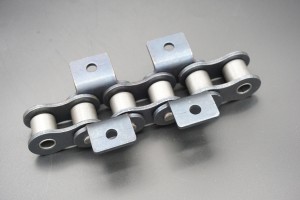Conveyor systems are an integral part of every industry, facilitating the movement of materials and products from one place to another. These systems rely on a series of components to function effectively, one of the most critical elements being the roller chain. Roller chains play a key role in ensuring the smooth and efficient operation of conveyor systems in different applications. In this article, we will explore the importance of roller chains in conveyor systems and their impact on the overall performance and reliability of these important industrial installations.
A roller chain is a power transmission chain consisting of a series of cylindrical rollers connected together by side plates. These chains are designed to transmit mechanical power and motion between rotating shafts, making them ideal for driving conveyor belts and other types of conveying equipment. The design and construction of roller chains make them ideal for handling heavy loads and operating in demanding environments, making them a popular choice for conveyor systems in industries such as manufacturing, food processing, logistics, and more.
One of the main functions of roller chains in conveyor systems is to transmit motion from the drive unit to the conveyor belt or other conveyor elements. The sprockets on the drive mesh with the chain’s rollers, causing them to rotate and drive the movement of the conveyor belt. This power transfer is critical to ensuring that materials and products are transported smoothly and efficiently along the conveyor system. The rugged and reliable nature of roller chains enables them to handle the continuous and often heavy-duty operations required in industrial conveying applications.
In addition to power transmission, roller chains contribute to the overall stability and alignment of the conveyor system. Proper tensioning and alignment of roller chains is critical to preventing slippage, reducing wear, and maintaining the overall integrity of the conveyor system. Chain misalignment or poor tensioning can result in inefficiencies, increased maintenance requirements, and potential downtime, all of which can have a significant impact on productivity and operating costs. Therefore, the correct installation and maintenance of roller chains is crucial for optimal performance of the conveyor system.
Additionally, roller chains are designed to withstand the rigors of continuous operation in harsh environments. Factors such as dust, debris, moisture and temperature changes are common in industrial environments and can pose significant challenges to the components of a conveyor system. Roller chains are typically made from durable materials such as carbon, stainless or alloy steel and are engineered to resist corrosion, wear and fatigue. This inherent elasticity allows roller chains to maintain their performance and reliability even under harsh operating conditions, ensuring uninterrupted material flow along the conveyor system.
Another key aspect of roller chains in conveyor systems is their contribution to overall safety. Conveyor systems often involve the handling of heavy or bulky materials, and the reliable operation of these systems is critical to preventing accidents and injuries in the workplace. If properly selected and maintained, roller chains can provide a safe and reliable means of transmitting power within a conveyor system, thereby reducing the risk of unexpected failure or failure that could compromise safety. Additionally, using high-quality roller chains with appropriate safety features can further enhance the overall safety of the conveyor system, giving operators and workers peace of mind.
In short, roller chains are an integral part of the conveyor system and play a vital role in power transmission, stability, durability and safety. Their ability to efficiently transmit motion, withstand harsh operating conditions and contribute to the smooth operation of conveyor systems makes them a cornerstone of industrial conveying applications. As the industry continues to evolve, placing greater demands on the efficiency and reliability of conveyor systems, the importance of roller chains in supporting these requirements cannot be overstated. By understanding and appreciating the importance of roller chains, companies can make informed decisions regarding the selection, installation and maintenance of these important components, ultimately ensuring optimal performance and longevity of their conveyor systems.
Post time: Jul-31-2024

